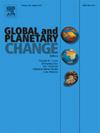Influence of climatic variables on biome transitions in the Colombian and Panamanian Caribbean region
IF 4
1区 地球科学
Q1 GEOGRAPHY, PHYSICAL
引用次数: 0
Abstract
Disentangling the environmental determinants of tropical biomes is crucial for understanding their response to climate change. This study investigated the effect of climate and soil-related variables on biome transitions in the Caribbean region of Colombia and Panama, focusing on xerophytic forest (XF), tropical dry forest (TDF), and tropical rainforest (TRF). We analyzed the climatic variables at different time scales (daily, seasonal, and annual) and their interaction with soil properties. We performed an ordinal logistic regression to assess the combined effect of the most important variables in biome transitions. Our results showed that climate variables are major discriminators in our study region, particularly precipitation at a seasonal and annual scale. The ordinal logistic regression highlighted the significance of annual precipitation and dry-season length in biome transitions, with maximum temperature impacting TDF-TRF transitions. Soil differences, although present (e.g., higher sand content in XF), played a marginal role. Overall, our findings emphasize the dominance of climate over soil in shaping tropical biome distributions in the northern Caribbean part of South America. These findings contribute to a deeper understanding of tropical biome responses to climate change.
气候变量对哥伦比亚和巴拿马加勒比地区生物群落转变的影响
解开热带生物群落的环境决定因素对于理解它们对气候变化的反应至关重要。本文研究了气候和土壤相关变量对哥伦比亚和巴拿马加勒比地区生物群落转变的影响,重点研究了旱生林(XF)、热带干林(TDF)和热带雨林(TRF)。分析了不同时间尺度(日、季、年)的气候变量及其与土壤性质的相互作用。我们进行了有序逻辑回归来评估生物群落转变中最重要变量的综合影响。结果表明,气候变量是主要的判别因子,尤其是季节和年尺度上的降水。有序logistic回归结果表明,年降水量和干季长度对生物群落过渡具有显著影响,最高温度对TDF-TRF过渡具有显著影响。土壤差异虽然存在(如XF含沙量较高),但起了次要作用。总的来说,我们的研究结果强调了气候在塑造南美洲北加勒比地区热带生物群落分布方面的主导地位。这些发现有助于更深入地了解热带生物群落对气候变化的响应。
本文章由计算机程序翻译,如有差异,请以英文原文为准。
求助全文
约1分钟内获得全文
求助全文
来源期刊

Global and Planetary Change
地学天文-地球科学综合
CiteScore
7.40
自引率
10.30%
发文量
226
审稿时长
63 days
期刊介绍:
The objective of the journal Global and Planetary Change is to provide a multi-disciplinary overview of the processes taking place in the Earth System and involved in planetary change over time. The journal focuses on records of the past and current state of the earth system, and future scenarios , and their link to global environmental change. Regional or process-oriented studies are welcome if they discuss global implications. Topics include, but are not limited to, changes in the dynamics and composition of the atmosphere, oceans and cryosphere, as well as climate change, sea level variation, observations/modelling of Earth processes from deep to (near-)surface and their coupling, global ecology, biogeography and the resilience/thresholds in ecosystems.
Key criteria for the consideration of manuscripts are (a) the relevance for the global scientific community and/or (b) the wider implications for global scale problems, preferably combined with (c) having a significance beyond a single discipline. A clear focus on key processes associated with planetary scale change is strongly encouraged.
Manuscripts can be submitted as either research contributions or as a review article. Every effort should be made towards the presentation of research outcomes in an understandable way for a broad readership.
 求助内容:
求助内容: 应助结果提醒方式:
应助结果提醒方式:


